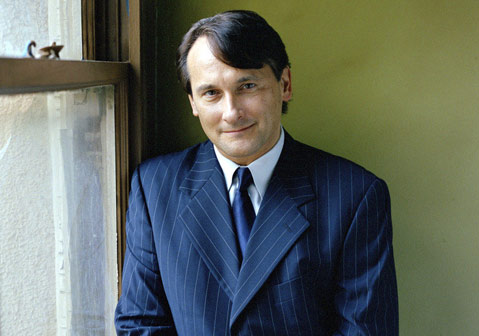Christopher O’Riley at the Lobero
CAMA Presents the Pianist in an All-Schumann Recital

Robert Schumann’s 200th birthday is marked in 2010, but classical music has become so dependent on anniversaries as a reason for the revisiting of an artist’s oeuvre that sometimes it is hard to tell what birthdays are really worth our attention. Surely entering a third century of musical currency counts for a lot, but what exactly does it mean? Thursday night’s piano recital by Christopher O’Riley at the Lobero, the second concert in CAMA’s 2010-2011 Masterseries, offers a great answer to this question, presenting an exceptionally self-aware performer in the service of a composer, Robert Schumann, who is both uncompromising and, even after 200 years, far from fully understood.
O’Riley has made an unorthodox career out of a unique combination of talents—he’s the host of NPR’s From the Top, he’s a successful recording artist and performer of original piano transcriptions of music by rock luminaries like Elliott Smith, Radiohead, and Nick Drake, and he plays straight classical recitals such as the one he will give here, which is all Schumann. I spoke with O’Riley by phone last week.
Schumann’s entering his third century on the heels of Chopin—is this a significant historical moment, or just an excuse to revisit the work of these composers? I suppose with Schumann it’s more of a good excuse. We didn’t really need an excuse to play Chopin, as he has been pretty much unvaryingly admired from the beginning of his career until now. Schumann’s peripatetic style and the sort of wayward path of his life have made him somewhat less well-regarded. Personally, I have a soft spot in my heart for Schumann. He seems the epitome of the Romantic spirit in music. It’s not just his wealth of melodic gifts, although those are considerable, but more his rhapsodic, serendipitous approach to musical form, and the significant originality of the formats in which he chose to compose that make him so special. Schumann is the architect of an entire sonic environment. The contours of his works are like mountainscapes.
Have you got any specific listening experiences with this music that inform what you are doing with it? My former teacher, Russell Sherman, has been playing this same program for the last couple of years, and that certainly influenced my choices. While it’s true the pieces inhabit a similar timeline [1836-1839], it’s really more about the complementary architectures of these works. You have the poetic, the rhapsodic, and in the Fantasy you get the composer’s full dialectic. That C Major Fantasy is a very close relative to Beethoven. The Kreisleriana is extremely circumscribed in its harmonic development, but it conveys tension; there’s a sense of yin and yang. The Fantasy, with what appears to be a conventional three-part structure, is actually more episodic than the Kreisleriana. All of it takes active listening.
What do you think is Schumann’s chief contribution to music? He’s probably the earliest truly cinematic composer—even more so than Beethoven. Beethoven is never as diverse within the confines of a single movement as Schumann dares to be. It’s Schumann’s greatest gift—he can encompass so widely in terms of his sonic environment while remaining within the form.
Schumann sometimes wrote music criticism in the form of a dialogue. Do you sense a split personality in his music? What comes through in the music is the degree to which he was capable of acknowledging his separate personae, and honestly, it makes for great art. His best things feel as though they exist independently of their creator. He’s both ultra-personal and extra-personal at the same time.
4•1•1
Christopher O’Riley performs at the Lobero Theatre (33 E. Canon Perdido St.) on Thursday, November 11 at 8 p.m. For tickets and information, call 963-0761 or visit lobero.com.



